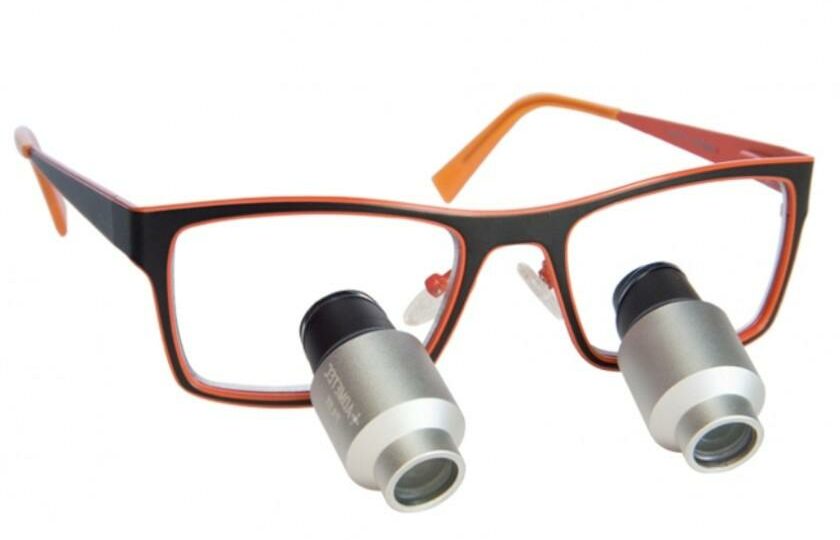As a dentist, choosing your first dental loupes is a significant step in your oral healthcare journey. These magnification devices can enhance your vision, precision, and productivity, reducing the strain on your body. With so many options available, it can be a challenging process to choose the right one. This blog provides a comprehensive guide on how you can buy dental loupes. So, let’s have a look at the factors that you must consider while buying your first dental loupe:
Understand What Dental Loupes Are and Their Importance
Dental loupes for dentists are magnifying glasses that are worn to improve their vision during procedures. By increasing magnification, they allow for better precision, reducing the risk of errors. They also improve the dentist’s posture by reducing the need to lean in to see small details, leading to less strain and fatigue.
Types of Dental Loupes
Before choosing the right dental loupes, it is important for you to know the type of dental loupes available. There are two main types of dental loupes: through-the-lens (TTL) and flip-up loupes. TTL loupes are lighter, have magnification lenses embedded in the spectacles, and are custom-made to fit your interpupillary distance. On the other hand, flip-up loupes can be adjusted to your liking, are mounted on the spectacles, and can be flipped up when not in use. Let’s explore in more detail about these two:
#1 Through-The-Lens (TTL) Loupes
Through-The-Lens, or TTL loupes, are characterized by their magnification lenses which are directly built or embedded into the spectacle lens. This type of design reduces the weight of the loupes since there are no additional mechanisms or parts necessary for adjusting the lenses. Hence, they are generally lighter, providing an advantage in terms of comfort during long procedures.
Moreover, TTL loupes are custom-made to match each dentist’s unique interpupillary distance (the distance between the centers of the pupils of the eyes), which ensures that the field of vision is perfectly aligned with the eye. This customization offers better ergonomics, reducing the strain on the eyes.
The primary limitation of TTL loupes is their lack of adjustability once manufactured. They are fixed, and the angle or position of the magnifying lens cannot be altered. Therefore, they require precise measurements before manufacture.
#2 Flip-Up Loupes
Flip-up loupes, as the name suggests, are designed with lenses that can be flipped up or down. The magnification lenses are mounted onto the glasses and can be flipped out of the line of sight when not needed, providing flexibility in usage. For instance, dentists can flip them up while consulting with patients, and flip them down when they need to work on a procedure.
One key advantage of flip-up loupes is their adjustability. The angle, interpupillary distance, and the convergence of the lenses can be adjusted to suit the dentist’s preference, allowing for a more personalized fit. This adaptability makes flip-up loupes a popular choice for shared equipment or environments where different users may need to use the same pair.
However, flip-up loupes can be heavier due to the added mechanism for flipping and adjusting the lenses. The added weight might make them less comfortable than TTL loupes during long procedures.
Magnification Levels
Dental loupes come in different magnification levels, typically ranging from 2.0x to 6.0x. For beginners, lower magnification levels (between 2.0x and 2.5x) are recommended as they offer a wider field of view and depth of field, making them easier to use. As you become more experienced, you might want to explore higher magnification levels for intricate procedures.
Working Distance
The working distance, or the space between your eyes and your patient’s mouth, is a critical factor to consider. The correct working distance promotes good posture and comfort. Each dentist has a unique working distance, which depends on their height and the way they work.
Field of View
The field of view is the area that you can see through the loupes. A wider field of view allows you to see more of the patient’s mouth without moving your head. However, remember that as magnification increases, the field of view decreases.
Depth of Field
The depth of field refers to the range within which the image remains in focus without the need for refocusing. A larger depth of field provides a greater comfort level, especially for beginners.
Weight and Comfort
The weight of the dental loupes impacts comfort during long procedures. Lightweight loupes reduce the risk of neck strain. TTL loupes are generally lighter than flip-up ones, but the exact weight also depends on the frame and the additional features like lights.
Resolution and Optic Quality
Good quality optics provide clear and sharp images, reducing the need to strain your eyes. Look for loupes with high-resolution optics and anti-reflective coating.
Frame Style
Dental loupes come in various frames, and the right one depends on your personal preference and comfort. Some people prefer a sporty wraparound style, while others prefer a more traditional spectacle style. Ensure that the frame fits well and is adjustable, and can accommodate prescription lenses if required.
Additional Features
Some dental loupes come with additional features like LED headlights, which can provide better illumination. Though these features might add to the cost, they can be beneficial for certain procedures.
Budget
Dental loupes can range from a few hundred to a few thousand dollars, depending on the features. While cost is a factor to consider, it should not be at the expense of comfort, posture, and vision. It’s essential to consider dental loupes as an investment in your health and your career.
Wrapping Up
Choosing your first dental loupes is an important decision that can impact your career and health. Careful consideration of the factors above, along with personal preference and comfort, will help guide your decision. With the right dental loupes, you will be well on your way to enhancing your skills and providing superior dental care.








